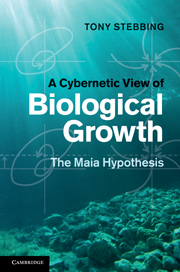Book contents
- Frontmatter
- Contents
- Foreword by Ernest Naylor
- Preface: ‘A fragment of a possible world’
- Acknowledgements
- 1 Introduction
- 2 Growth unlimited: blooms, swarms and plagues
- 3 Self-regulating systems: from machines to humans
- 4 The wealth of homeodynamic responses
- 5 A cybernetic approach to growth analysis
- 6 A control mechanism for Maia
- 7 The three levels of adaptation
- 8 Population growth and its control
- 9 Hierarchy: a controlled harmony
- 10 History of hormesis and links to homeopathy
- 11 Maian mechanisms for hormesis and catch-up growth
- 12 Cellular growth control and cancer
- 13 Human overpopulation
- 14 Our finite Earth
- 15 The Maia hypothesis and anagenesis
- Glossary
- Further reading
- References
- Index
13 - Human overpopulation
Published online by Cambridge University Press: 10 January 2011
- Frontmatter
- Contents
- Foreword by Ernest Naylor
- Preface: ‘A fragment of a possible world’
- Acknowledgements
- 1 Introduction
- 2 Growth unlimited: blooms, swarms and plagues
- 3 Self-regulating systems: from machines to humans
- 4 The wealth of homeodynamic responses
- 5 A cybernetic approach to growth analysis
- 6 A control mechanism for Maia
- 7 The three levels of adaptation
- 8 Population growth and its control
- 9 Hierarchy: a controlled harmony
- 10 History of hormesis and links to homeopathy
- 11 Maian mechanisms for hormesis and catch-up growth
- 12 Cellular growth control and cancer
- 13 Human overpopulation
- 14 Our finite Earth
- 15 The Maia hypothesis and anagenesis
- Glossary
- Further reading
- References
- Index
Summary
Population is the problem of our age.
Julian HuxleyNature always knows where to stop. The great miracle of growth is surpassed in Nature by the miracle of the natural cessation of growth.
E.F. SchumacherWhen a single species grows exponentially without regard for carrying capacity, it will suffer an ignoble fate.
Paul HawkenRECOGNITION OF OVERPOPULATION AS A GLOBAL PROBLEM
The growing human population was seen as a threat by Alexander Carr-Saunders (1886–1966) in his book The Population Problem published in 1922. It inspired his Oxford friend and colleague Julian Huxley (1887–1975), for whom the analysis of populations was to influence his later work and thought. Even in the 1930s, Huxley was lecturing on the importance of family planning and birth control, given what he then recognised as the dangers of overpopulation. In 1931 he wrote the final section on the Breeding of Mankind for the Science of Life, by H.G. Wells, J.S. Huxley and G.P Wells: a large volume far ahead of its time in advocating birth control. In it he set out the argument that projected overcrowding from growth rates then calculated at 1% per annum.
From 1946 to 1948 Huxley was the first Director General of UNESCO, and in his new role travelled the world, realising for himself the extent of the growing problem of global overpopulation. In 1949 the UN planned a conference on World Resources, and invited Huxley's continued involvement.
- Type
- Chapter
- Information
- A Cybernetic View of Biological GrowthThe Maia Hypothesis, pp. 327 - 358Publisher: Cambridge University PressPrint publication year: 2010



